仁爱科普版(2024)七年级英语下册Unit 7 Being a Smart Shopper Preparing for the Topic Listening & Speaking 课件(23张PP
文档属性
| 名称 | 仁爱科普版(2024)七年级英语下册Unit 7 Being a Smart Shopper Preparing for the Topic Listening & Speaking 课件(23张PP | 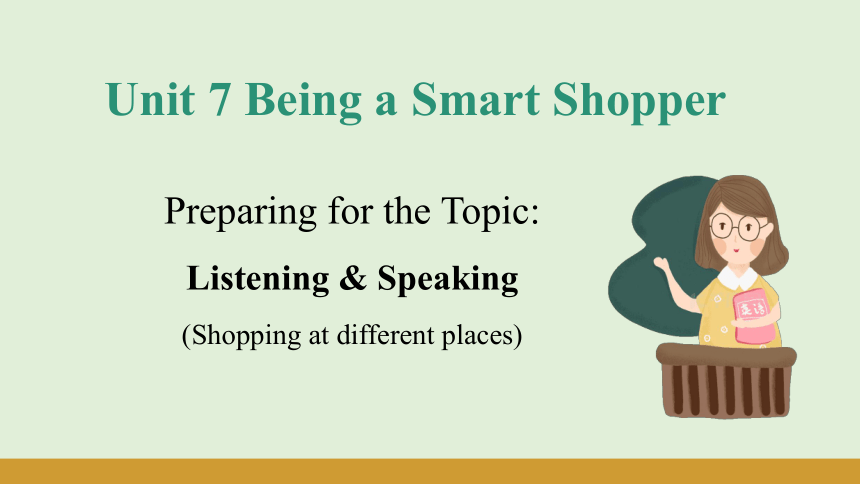 | |
| 格式 | pptx | ||
| 文件大小 | 92.2MB | ||
| 资源类型 | 教案 | ||
| 版本资源 | 仁爱科普版 | ||
| 科目 | 英语 | ||
| 更新时间 | 2025-04-03 21:29:43 | ||
图片预览

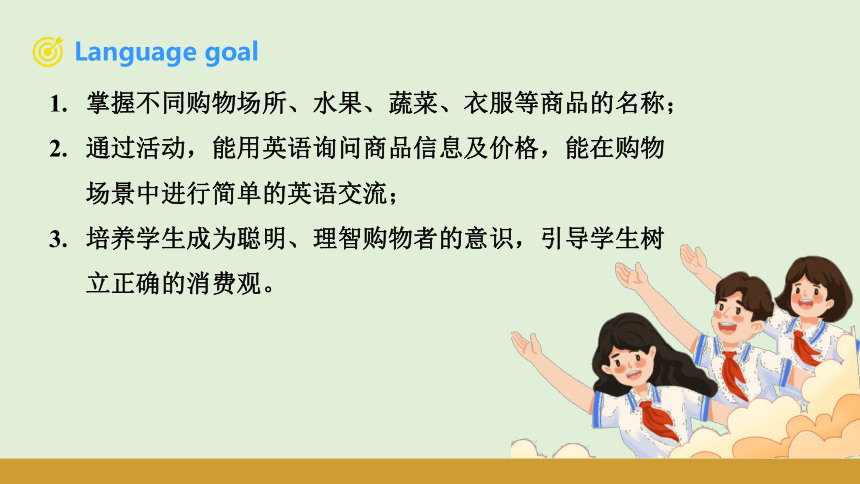
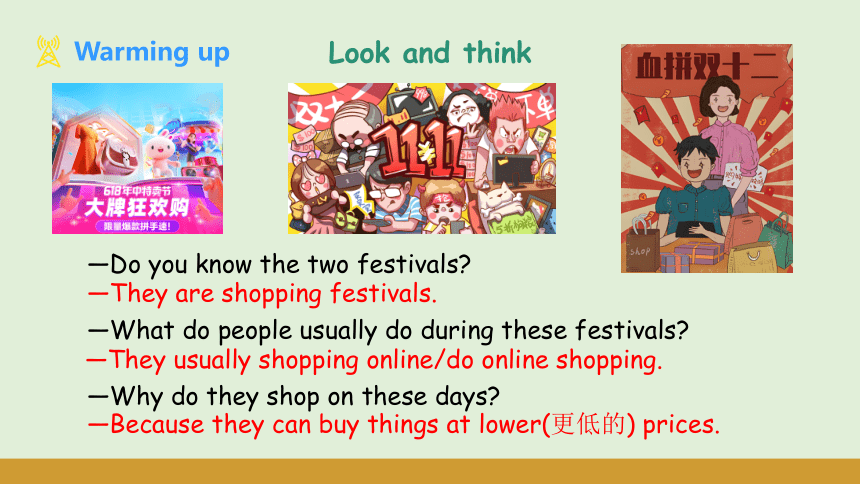
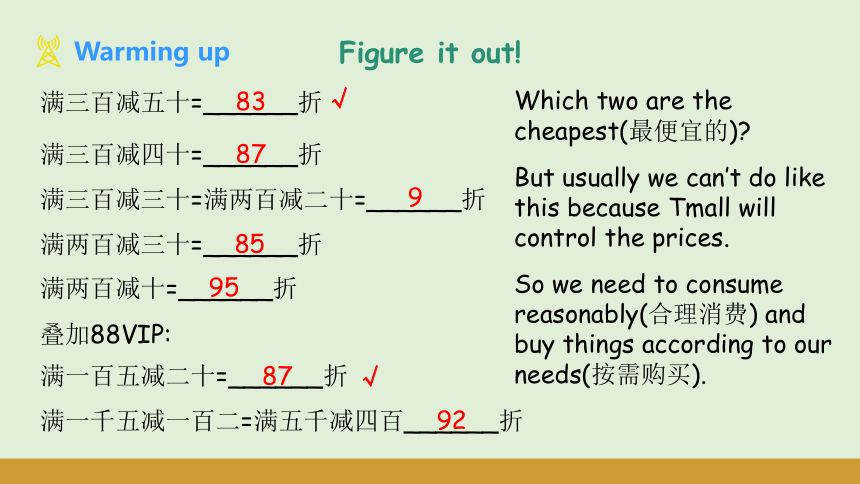

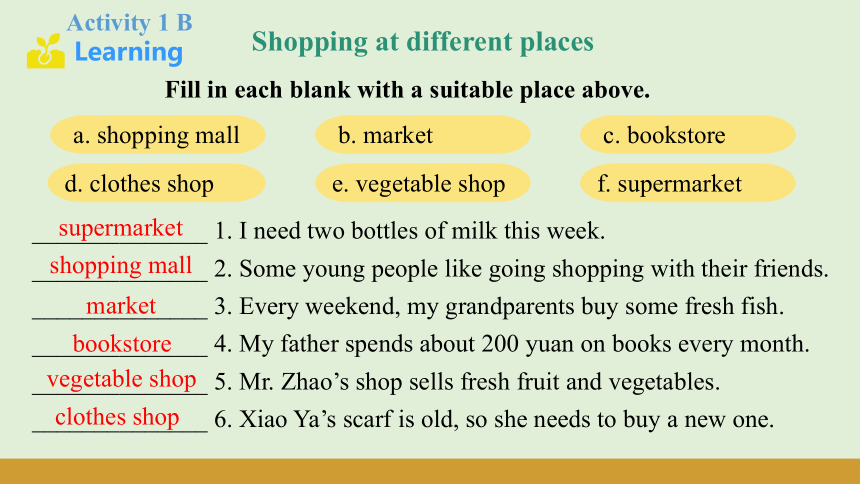
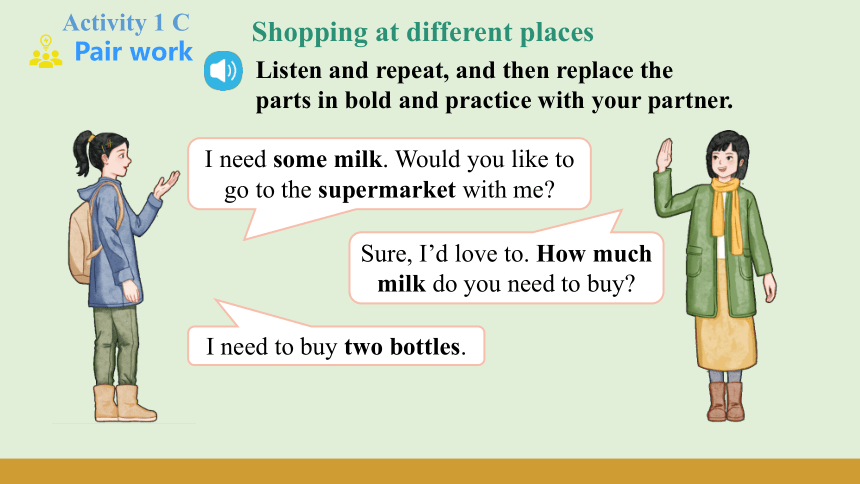

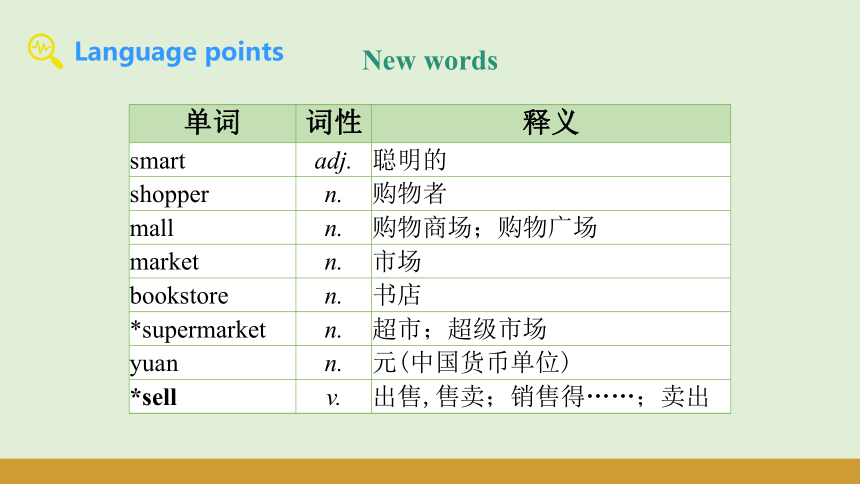
文档简介
(共23张PPT)
Unit 7 Being a Smart Shopper
Preparing for the Topic:
Listening & Speaking
(Shopping at different places)
掌握不同购物场所、水果、蔬菜、衣服等商品的名称;
通过活动,能用英语询问商品信息及价格,能在购物场景中进行简单的英语交流;
培养学生成为聪明、理智购物者的意识,引导学生树立正确的消费观。
—Do you know the two festivals
—They are shopping festivals.
—What do people usually do during these festivals
—They usually shopping online/do online shopping.
—Why do they shop on these days
—Because they can buy things at lower(更低的) prices.
Look and think
Figure it out!
满三百减五十=______折
满三百减四十=______折
满两百减三十=______折
满三百减三十=满两百减二十=______折
满两百减十=______折
满一千五减一百二=满五千减四百______折
满一百五减二十=______折
83
87
9
85
95
92
87
√
叠加88VIP:
√
Which two are the cheapest(最便宜的)
But usually we can’t do like this because Tmall will control the prices.
So we need to consume reasonably(合理消费) and buy things according to our needs(按需购买).
b. market
e. vegetable shop
f. supermarket
c. bookstore
Activity 1 A
Shopping at different places
Match the places (a-f) with the pictures at the the top of the next page.
a. shopping mall
d. clothes shop
f
e
d
c
a
b
Activity 1 B
Shopping at different places
Fill in each blank with a suitable place above.
______________ 1. I need two bottles of milk this week.
______________ 2. Some young people like going shopping with their friends.
______________ 3. Every weekend, my grandparents buy some fresh fish.
______________ 4. My father spends about 200 yuan on books every month.
______________ 5. Mr. Zhao’s shop sells fresh fruit and vegetables.
______________ 6. Xiao Ya’s scarf is old, so she needs to buy a new one.
shopping mall
supermarket
market
bookstore
vegetable shop
clothes shop
b. market
e. vegetable shop
f. supermarket
c. bookstore
a. shopping mall
d. clothes shop
Activity 1 C
Shopping at different places
Listen and repeat, and then replace the parts in bold and practice with your partner.
I need some milk. Would you like to go to the supermarket with me
I need to buy two bottles.
Sure, I’d love to. How much milk do you need to buy
Activity 2
Shopping at different places
Listen to the conversation and complete the shopping list.
A Shopping List
salt ______ bag(s)
strawberries ______ kilo(s)
coffee ______ can(s)
one
two
three
单词 词性 释义
smart adj. 聪明的
shopper n. 购物者
mall n. 购物商场;购物广场
market n. 市场
bookstore n. 书店
*supermarket n. 超市;超级市场
yuan n. 元(中国货币单位)
*sell v. 出售,售卖;销售得……;卖出
New words
New words
单词 词性 释义
*fruit n. 水果;果实
scarf n. 围巾;披巾;头巾
would modal v. (客气地建议或邀请);(表示愿意、不愿意等);将会
*sure adv. 当然
list n. 清单;目录
salt n. 盐,食盐
*bag n. 购物袋;手提袋;提包
New words & phrases
单词 词性 释义
strawberry n. 草莓
kilo (kilogram) n. 千克;公斤
coffee n. 咖啡
cabbage n. 甘蓝;卷心菜
*chicken n. 鸡肉;鸡
tofu n. 豆腐
watermelon n. 西瓜
carrot n. 胡萝卜
go shopping 购物
Tapescripts听力文本
Activity 2
Shopping at different places
Listen again and fill in the blanks.
A: There isn’t ______ fruit at home.
B: And we don’t have any ______.
A: Let’s make a shopping ______ and go to the ___________ then.
B: Sure. What do we need
A: Let me see. We need ______ salt, coffee and ___________.
B: How ______ salt do we need
A: We need ______ bag of salt.
B: How ______ strawberries should we buy
A: We should buy three ______ of strawberries.
B: Coffee
A: What about two ______ of coffee
B: OK.
supermarket
any
salt
list
some
strawberries
much
one
many
kilos
cans
Tapescripts听力文本
Activity 2
Shopping at different places
Listen to the conversation and complete the shopping list.
A: There isn’t any fruit at home.
B: And we don’t have any salt.
A: Let’s make a shopping list and go to the supermarket then.
B: Sure. What do we need
A: Let me see. We need some salt, coffee and strawberries.
B: How much salt do we need
A: We need one bag of salt.
B: How many strawberries should we buy
A: We should buy three kilos of strawberries.
B: Coffee
A: What about two cans of coffee
B: OK.
Sentences
1. I need two bottles of milk this week.
这个星期我需要两瓶牛奶。
need 用作实义动词时意为“需要;有必要”,后面接名词、代词、动词不定式等。例如:
I need some help. 我需要一些帮助。
Where’s his pen He needs it. 他的笔呢?他需要它。
I need to get some sleep. 我需要睡会儿觉。
Sentences
2. My father spends about 200 yuan on books every month.
我父亲每个月大约花 200元钱买书。
(1)spend + 时间/金钱 + on sth. 意为“在……上花费时间/金钱”,相当于spend + 时间/金钱 +(in)doing sth.。例如:
After school, I usually spend one hour on basketball. (After school, I usually spend one hour
in playing basketball.) 放学后,我通常花一个小时打篮球。(句中的in 可省略)
Sentences
(2)spend、cost、pay 都有“花钱消费”的含义,但在使用时要注意区别。
spend 意为“花费”时,主语是“人”,常用的搭配是“sb. spend (money) on sth.”,意为“某人在某物上花费多少钱”。例如:
She spends half of her money on books. 她把一半的钱花费在书籍上。
cost 意为“花费”时,主语是“物”,常用的搭配是“sth. cost sb. (money)”,意为“某物花费某人多少钱”。例如:
The ticket costs me 15 yuan. 这张票花费了我15 元。
pay 意为“支付”时,主语是“人”,常用的搭配是“sb. pay (money) for sth.”,意为“某人花费多少钱买某物”。例如:
She paid ten yuan for the book. 她花十元钱买了这本书。
3. ―Would you like to go to the supermarket with me
你愿意和我一起去超市吗?
―Sure, I’d love to. 当然,我乐意。
“Would you like … ”意为“你愿意……吗?你想要……吗 ”后面可接名词、代词或动词不定式,用于礼貌地提出建议或发出邀请,有时也含有请求的意思。该句肯定回答常用“Yes/Sure, please.”或“Yes/Sure, I’d love to.”;否定回答常用“No, thanks.”或“I’d love to, but ...”
加以婉拒。例如:
—Would you like a cup of tea 你想喝杯茶吗?
—Yes, please./No, thanks. 好的。/不,谢谢。
—Would you like to play basketball after school 放学后你想打篮球吗?
— I’d love to, but I need to go back home first. 我很乐意,但我需要先回家。
Sentences
4. ― How much milk do you need to buy 你需要买多少牛奶?
― I need to buy two bottles. 我需要买两瓶。
(1)how much 意为“多少……(钱)?”常用来询问物品的价格或事物的数量。用来询
问事物的数量时,后接不可数名词。例如:
— How much is this skirt 这条裙子多少钱?
— 80 yuan. 80 元。
— How much meat do you need 你需要多少肉?
—Two kilos. 两千克。
(2)how many 用来询问事物的数量,后接可数名词复数。例如:
— How many apples are there 有多少个苹果?
— There are 12. 有12 个。
Sentences
Activity 3
Shopping at different places
Talk about what you need for lunch on Sunday and
make a shopping list. The following pictures may help you.
cabbages
chicken
watermelons
tofu
strawberries
carrots
1. He wants to buy some chicken. (对画线部分提问)
________ ________ chicken does he want to buy
2. She has a brother. (对画线部分提问)
How many ________ ________ she have
3. There are eighteen girls in our class. (对画线部分提问)
________ ________ girls are there in your class
4. There are some kilos of cabbages in the basket. (改为否定句)
There ________ ________ kilos of cabbages in the basket.
按要求完成句子。
How much
brothers does
How many
aren’t any
Shopping is a part of our daily lives, but not everyone knows 1. __________ to be a smart shopper. Here are some useful tips from Lingling.
Before going 2. __________(shop), she always makes 3. __________ list. She writes down things like carrots, watermelons, chicken and fish. And then when she’s at the store, she starts to compare prices. For example, if she would like 4. __________(buy) a scarf, she will check the price of different styles of 5. __________(scarf). Also she likes 6. __________(look) for sales, so that she can 7. __________(take) things at good prices. Of course, she also makes sure to check their quality 8. __________(careful).
All in all, being a smart shopper 9. __________(make) her very happy. Because she not only saves much money 10. __________ herself, but also does’t waste resources(资源)!
短文填空。
how
shopping
a
to buy
scarves
take
looking
carefully
makes
for
We learn:
the names of different shopping places, fruits, vegetables, clothes and other goods.
sentence patterns
—I need some/to buy ... Would you like to go to ... with me
—Sure, I’d love to. How much/How many ... do you need to buy
We can:
make a shopping list before shopping.
1. Ask your parents what you need for meals tomorrow and make a shopping list.
2. Finish the exercises.
Unit 7 Being a Smart Shopper
Preparing for the Topic:
Listening & Speaking
(Shopping at different places)
掌握不同购物场所、水果、蔬菜、衣服等商品的名称;
通过活动,能用英语询问商品信息及价格,能在购物场景中进行简单的英语交流;
培养学生成为聪明、理智购物者的意识,引导学生树立正确的消费观。
—Do you know the two festivals
—They are shopping festivals.
—What do people usually do during these festivals
—They usually shopping online/do online shopping.
—Why do they shop on these days
—Because they can buy things at lower(更低的) prices.
Look and think
Figure it out!
满三百减五十=______折
满三百减四十=______折
满两百减三十=______折
满三百减三十=满两百减二十=______折
满两百减十=______折
满一千五减一百二=满五千减四百______折
满一百五减二十=______折
83
87
9
85
95
92
87
√
叠加88VIP:
√
Which two are the cheapest(最便宜的)
But usually we can’t do like this because Tmall will control the prices.
So we need to consume reasonably(合理消费) and buy things according to our needs(按需购买).
b. market
e. vegetable shop
f. supermarket
c. bookstore
Activity 1 A
Shopping at different places
Match the places (a-f) with the pictures at the the top of the next page.
a. shopping mall
d. clothes shop
f
e
d
c
a
b
Activity 1 B
Shopping at different places
Fill in each blank with a suitable place above.
______________ 1. I need two bottles of milk this week.
______________ 2. Some young people like going shopping with their friends.
______________ 3. Every weekend, my grandparents buy some fresh fish.
______________ 4. My father spends about 200 yuan on books every month.
______________ 5. Mr. Zhao’s shop sells fresh fruit and vegetables.
______________ 6. Xiao Ya’s scarf is old, so she needs to buy a new one.
shopping mall
supermarket
market
bookstore
vegetable shop
clothes shop
b. market
e. vegetable shop
f. supermarket
c. bookstore
a. shopping mall
d. clothes shop
Activity 1 C
Shopping at different places
Listen and repeat, and then replace the parts in bold and practice with your partner.
I need some milk. Would you like to go to the supermarket with me
I need to buy two bottles.
Sure, I’d love to. How much milk do you need to buy
Activity 2
Shopping at different places
Listen to the conversation and complete the shopping list.
A Shopping List
salt ______ bag(s)
strawberries ______ kilo(s)
coffee ______ can(s)
one
two
three
单词 词性 释义
smart adj. 聪明的
shopper n. 购物者
mall n. 购物商场;购物广场
market n. 市场
bookstore n. 书店
*supermarket n. 超市;超级市场
yuan n. 元(中国货币单位)
*sell v. 出售,售卖;销售得……;卖出
New words
New words
单词 词性 释义
*fruit n. 水果;果实
scarf n. 围巾;披巾;头巾
would modal v. (客气地建议或邀请);(表示愿意、不愿意等);将会
*sure adv. 当然
list n. 清单;目录
salt n. 盐,食盐
*bag n. 购物袋;手提袋;提包
New words & phrases
单词 词性 释义
strawberry n. 草莓
kilo (kilogram) n. 千克;公斤
coffee n. 咖啡
cabbage n. 甘蓝;卷心菜
*chicken n. 鸡肉;鸡
tofu n. 豆腐
watermelon n. 西瓜
carrot n. 胡萝卜
go shopping 购物
Tapescripts听力文本
Activity 2
Shopping at different places
Listen again and fill in the blanks.
A: There isn’t ______ fruit at home.
B: And we don’t have any ______.
A: Let’s make a shopping ______ and go to the ___________ then.
B: Sure. What do we need
A: Let me see. We need ______ salt, coffee and ___________.
B: How ______ salt do we need
A: We need ______ bag of salt.
B: How ______ strawberries should we buy
A: We should buy three ______ of strawberries.
B: Coffee
A: What about two ______ of coffee
B: OK.
supermarket
any
salt
list
some
strawberries
much
one
many
kilos
cans
Tapescripts听力文本
Activity 2
Shopping at different places
Listen to the conversation and complete the shopping list.
A: There isn’t any fruit at home.
B: And we don’t have any salt.
A: Let’s make a shopping list and go to the supermarket then.
B: Sure. What do we need
A: Let me see. We need some salt, coffee and strawberries.
B: How much salt do we need
A: We need one bag of salt.
B: How many strawberries should we buy
A: We should buy three kilos of strawberries.
B: Coffee
A: What about two cans of coffee
B: OK.
Sentences
1. I need two bottles of milk this week.
这个星期我需要两瓶牛奶。
need 用作实义动词时意为“需要;有必要”,后面接名词、代词、动词不定式等。例如:
I need some help. 我需要一些帮助。
Where’s his pen He needs it. 他的笔呢?他需要它。
I need to get some sleep. 我需要睡会儿觉。
Sentences
2. My father spends about 200 yuan on books every month.
我父亲每个月大约花 200元钱买书。
(1)spend + 时间/金钱 + on sth. 意为“在……上花费时间/金钱”,相当于spend + 时间/金钱 +(in)doing sth.。例如:
After school, I usually spend one hour on basketball. (After school, I usually spend one hour
in playing basketball.) 放学后,我通常花一个小时打篮球。(句中的in 可省略)
Sentences
(2)spend、cost、pay 都有“花钱消费”的含义,但在使用时要注意区别。
spend 意为“花费”时,主语是“人”,常用的搭配是“sb. spend (money) on sth.”,意为“某人在某物上花费多少钱”。例如:
She spends half of her money on books. 她把一半的钱花费在书籍上。
cost 意为“花费”时,主语是“物”,常用的搭配是“sth. cost sb. (money)”,意为“某物花费某人多少钱”。例如:
The ticket costs me 15 yuan. 这张票花费了我15 元。
pay 意为“支付”时,主语是“人”,常用的搭配是“sb. pay (money) for sth.”,意为“某人花费多少钱买某物”。例如:
She paid ten yuan for the book. 她花十元钱买了这本书。
3. ―Would you like to go to the supermarket with me
你愿意和我一起去超市吗?
―Sure, I’d love to. 当然,我乐意。
“Would you like … ”意为“你愿意……吗?你想要……吗 ”后面可接名词、代词或动词不定式,用于礼貌地提出建议或发出邀请,有时也含有请求的意思。该句肯定回答常用“Yes/Sure, please.”或“Yes/Sure, I’d love to.”;否定回答常用“No, thanks.”或“I’d love to, but ...”
加以婉拒。例如:
—Would you like a cup of tea 你想喝杯茶吗?
—Yes, please./No, thanks. 好的。/不,谢谢。
—Would you like to play basketball after school 放学后你想打篮球吗?
— I’d love to, but I need to go back home first. 我很乐意,但我需要先回家。
Sentences
4. ― How much milk do you need to buy 你需要买多少牛奶?
― I need to buy two bottles. 我需要买两瓶。
(1)how much 意为“多少……(钱)?”常用来询问物品的价格或事物的数量。用来询
问事物的数量时,后接不可数名词。例如:
— How much is this skirt 这条裙子多少钱?
— 80 yuan. 80 元。
— How much meat do you need 你需要多少肉?
—Two kilos. 两千克。
(2)how many 用来询问事物的数量,后接可数名词复数。例如:
— How many apples are there 有多少个苹果?
— There are 12. 有12 个。
Sentences
Activity 3
Shopping at different places
Talk about what you need for lunch on Sunday and
make a shopping list. The following pictures may help you.
cabbages
chicken
watermelons
tofu
strawberries
carrots
1. He wants to buy some chicken. (对画线部分提问)
________ ________ chicken does he want to buy
2. She has a brother. (对画线部分提问)
How many ________ ________ she have
3. There are eighteen girls in our class. (对画线部分提问)
________ ________ girls are there in your class
4. There are some kilos of cabbages in the basket. (改为否定句)
There ________ ________ kilos of cabbages in the basket.
按要求完成句子。
How much
brothers does
How many
aren’t any
Shopping is a part of our daily lives, but not everyone knows 1. __________ to be a smart shopper. Here are some useful tips from Lingling.
Before going 2. __________(shop), she always makes 3. __________ list. She writes down things like carrots, watermelons, chicken and fish. And then when she’s at the store, she starts to compare prices. For example, if she would like 4. __________(buy) a scarf, she will check the price of different styles of 5. __________(scarf). Also she likes 6. __________(look) for sales, so that she can 7. __________(take) things at good prices. Of course, she also makes sure to check their quality 8. __________(careful).
All in all, being a smart shopper 9. __________(make) her very happy. Because she not only saves much money 10. __________ herself, but also does’t waste resources(资源)!
短文填空。
how
shopping
a
to buy
scarves
take
looking
carefully
makes
for
We learn:
the names of different shopping places, fruits, vegetables, clothes and other goods.
sentence patterns
—I need some/to buy ... Would you like to go to ... with me
—Sure, I’d love to. How much/How many ... do you need to buy
We can:
make a shopping list before shopping.
1. Ask your parents what you need for meals tomorrow and make a shopping list.
2. Finish the exercises.
同课章节目录
